Introduction:
In the ever-evolving landscape of cybersecurity, it’s crucial to employ robust tools and strategies to protect sensitive data. One such tool integrated into Microsoft Windows operating systems is BitLocker – a disk encryption program with a myriad of applications. In this blog post, we’ll delve into 20 key use cases for BitLocker, shedding light on its significance in safeguarding data.
BitLocker Use Cases:
Full Disk Encryption:
BitLocker’s primary function is to encrypt the entire disk drive, providing comprehensive protection for stored data.
Data Confidentiality:
By encrypting sensitive data, BitLocker ensures that confidential information remains private and secure.
Preventing Unauthorized Access:
In cases of lost or stolen devices, BitLocker acts as a barrier, preventing unauthorized access to the data within.
Secure Boot:
Working in tandem with UEFI secure boot, BitLocker ensures that only trusted software is loaded during the system boot process.
External Drive Encryption:
Extend data security beyond the main drive by using BitLocker to encrypt external USB drives.
Removable Drive Encryption:
BitLocker’s functionality isn’t limited to internal drives – it can also encrypt removable drives like external hard disks.
Operating System Drive Encryption:
Safeguard the operating system itself by applying BitLocker encryption to the drive where it is installed.
Network Unlock:
Automate the unlocking process by configuring BitLocker to unlock a drive when connected to a specific network.
Pre-Boot Authentication:
Add an extra layer of security by requiring authentication before the operating system loads.
Integration with Active Directory:
Centrally manage BitLocker through Group Policy and Active Directory, simplifying the enforcement of encryption policies.
Recovery Key Management:
Access encrypted drives even in the event of forgotten passwords by utilizing BitLocker’s recovery keys.
Encrypted File System:
Collaborate with Encrypting File System (EFS) for file-level encryption, enhancing overall data security.
Enhanced Data Protection:
Protect against offline attacks by ensuring that data remains encrypted when the system is turned off.
Compatibility with TPM:
Leverage Trusted Platform Module (TPM) integration to securely store BitLocker encryption keys.
Windows To Go:
Ensure a portable and secure Windows environment by using BitLocker to encrypt Windows To Go USB drives.
Remote Management:
Remotely manage BitLocker configurations through the convenient BitLocker Network Unlock feature.
Customizable Encryption Strength:
Tailor encryption strength to specific security requirements, choosing between 128-bit and 256-bit options.
Secure Hibernate:
BitLocker protects the hibernation file, preventing exposure of sensitive data during the hibernation process.
Multi-Factor Authentication:
Enhance security by configuring BitLocker to work seamlessly with multi-factor authentication measures.
Compliance with Data Protection Regulations:
Aid organizations in meeting data protection regulations by ensuring compliance through BitLocker’s encryption capabilities.
Conclusion:
In conclusion, BitLocker emerges as a versatile and indispensable tool in the realm of cybersecurity. From encrypting entire drives to providing recovery solutions, BitLocker plays a crucial role in fortifying data against unauthorized access and ensuring compliance with stringent data protection standards. By understanding its various use cases, users can harness the full potential of BitLocker to create a robust defense against potential threats in the digital landscape.

